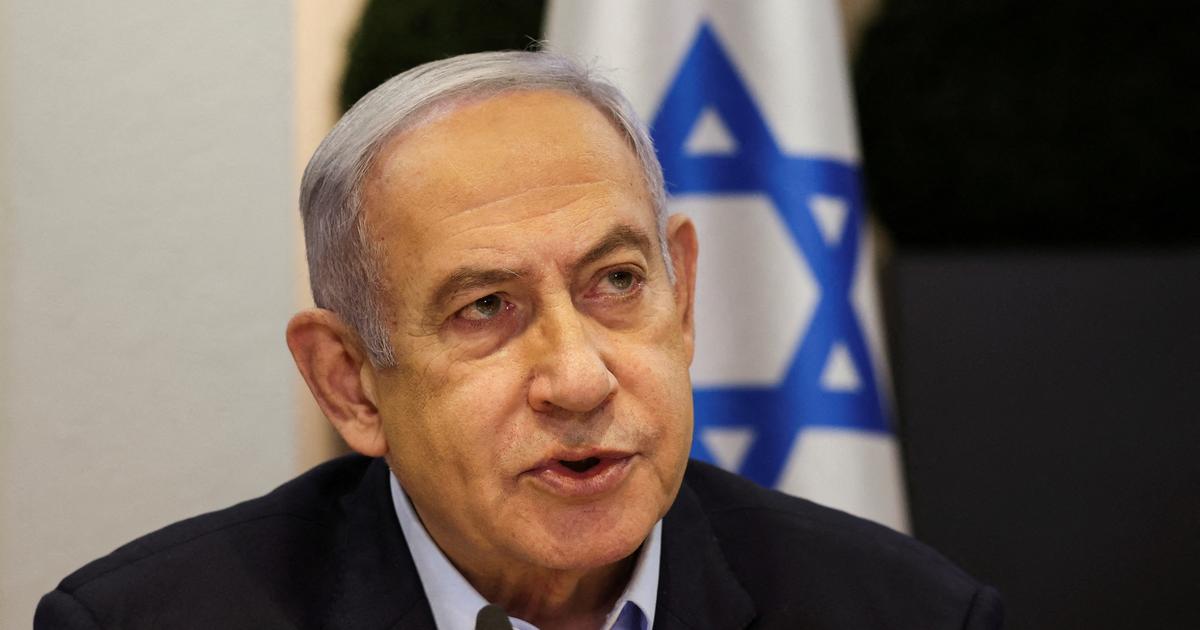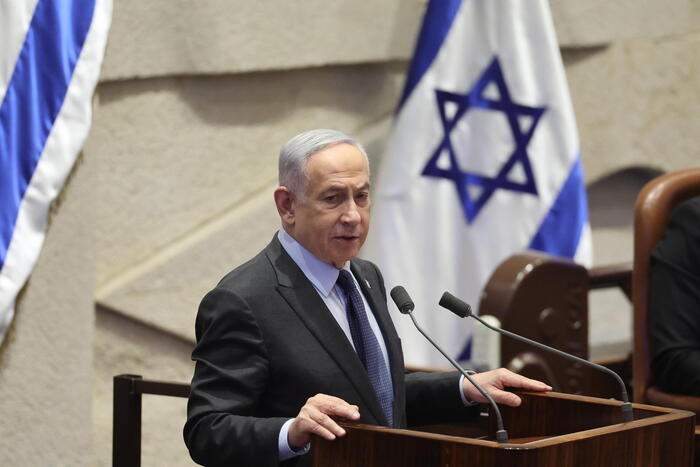Enlarge image
An Israeli airstrike in Gaza
Photo:
Haitham Imad / EPA
In the summer of 2019, Israeli Prime Minister Benjamin Netanyahu celebrated a triumphant date. On that day, July 21, he counted 4,876 non-consecutive days in office, one day more than David Ben-Gurion, who in 1948 became Israel's first prime minister. By that time a whole generation of Israelis had come to identify the term prime minister with Netanyahu's name, just as I and people of my generation had associated the term with the name Ben-Gurion. Netanyahu is the only Israeli prime minister who ever surpassed Ben-Gurion, but celebrating that day may have been the last joyful occasion in his political career: In fact, it seems to have marked the beginning of his downfall.
For by that time, it appeared that the longer "Bibi" as they call him stayed in office - the more Israelis yearned for the vision, statesmanship and mostly the integrity of his first predecessor. Indeed, half a century after his death, Ben-Gurion had become something of a legendary cult figure. While I was working on the story of his life, four other Ben-Gurion biographies appeared in Israel and a full-length documentary about him was produced. Hardly a day passed without some nostalgic reference to him in the media and public discourse.
Some basic issues Netanyahu actually approached in the spirit of Ben-Gurion, but not many people ever associated with him with integrity.
Eventually, he was put on trial for corruption, including bribery and was forced out.
His replacement marked the culmination of two dramatic years, including four inconclusive general elections.
The longest crisis in the history of Israel's democracy coincided with the corona pandemic and led many Israelis to abandon altogether their noted passion for politics, parting instead over almost one issue alone: Bibi or not Bibi.
Under Netanyahu, Israel consistently shifted to the right;
the Social Democratic "Left," which had once led the country and subsequently the opposition - vanished almost completely.
The systematic violation of human rights in the Palestinian territories occupied in 1967 became normal routine;
the number of Israeli settlers in the territories reached about half a million;
the so-called "Two-State Solution" to the Israeli-Palestinian conflict became obsolete.
Netanyahu has rarely spoken about the future of Israel and Palestine.
The son of an historian, he feels that he is carrying on the Zionist project that had started at the end of the 19th century.
He obviously knows that the longer Israel continues to rule the Palestinians, the less it is likely to survive as a Jewish and democratic country.
But similar to Ben-Gurion, Netanyahu does not believe in peace with the Palestinians.
"There is an abyss, and nothing can fill that abyss," Ben-Gurion declared as early as 1919. To the end of his days, he believed that the conflict could be managed at best, but not resolved.
Netanyahu, too, regards the Palestinians primarily as a permanent threat.
But unlike Ben-Gurion, who sought to reshape his nation's historical destiny, Netanyahu has acted more as a caretaker, concerned mostly with Israel's current security.
A strong believer in "divide and rule," he developed reasonable cooperation with the Palestinian Authority (PA) which controls parts of the West Bank, and left Gaza to Hamas, the PA's fierce Islamist rival.
Conditions in Gaza deteriorated atrociously, often approaching a humanitarian catastrophe.
From time to time, Hamas tried to make life on the Israeli side of the border unbearable as well, using self-made rockets and a variety of more improvised means, such as kites and even colorful birthday balloons, which set on fire Israeli plantations.
Under Netanyahu, Israel repeatedly reacted with considerable force, including occasional air strikes and four large-scale military operations.
The hide-and-seek games between F-35 combat aircrafts and children's balloons remained mostly inconclusive.
Some extremist members of Netanyahu's cabinet demanded more vindictive action, but he often preferred calculated pragmatism to ideological dogmas.
Thus, he wisely refrained from invading Gaza, did not formally annex the West Bank and limited most actions against Iran to cloak-and-dagger tactics, rather than open attacks.
His apparent restraint led most Israelis to believe that the Palestinian problem has come more or less under control;
no painful concessions seemed immediately necessary.
This comfortable illusion gained Netanyahu considerable support.
Unusually close contacts with then US President Donald Trump and the normalizing of relations with the United Arab Emirates and other Muslim countries boosted Netanyahu's prestige in the world as well.
A great performer, Netanyahu's impressive speeches, including as a guest of the US Congress and the UN General Assembly, depicted him as an international superstar, high above any potential rival in Israel.
Israel under Netanyahu also displayed a dramatic success story economically.
A graduate of MIT, he sought to make Israel a "start-up nation";
indeed, never before were so many Israelis so well off as under his leadership.
Many of his followers hailed him as "King Bibi," others called him "The Magician";
he seemed irreplaceable even to his foes.
I have been following Israeli politics and history for almost as long as I can remember. At 71, Netanyahu is the first Israeli prime minister younger than me. I expected few surprises and when Netanyahu lost his job I was stunned. He is not the first Israeli leader to be put on trial. Former Prime Minister Ehud Olmert served 16 months in jail for corruption. Over the years, a considerable number of cabinet ministers and mayors were also sent to jail for financial felonies. Thus, Israelis are often inclined to distrust their leaders until proven innocent.
King Bibi's case, however, was particularly farcical. According to one part of the indictment, he illegally received boxes of expensive cigars and bottles of pink champagne as gifts from some foreign and Israeli well-wishers. He pleaded not guilty to all charges; Indeed, the Netanyahus can afford all the cigars he wishes to smoke and all champagne his wife reportedly likes to drink. Bibi is a notorious bon-vivant, and so are his third wife Sarah and his eldest son Yair.
Their lifestyle, often in the company of international tycoons, had raised scandalous criticism even before he was brought to court. Still, I failed to comprehend how such a brilliant man, officer, diplomat, businessman and national leader could risk so much for so little, including his political career and place in history. Of course, it could have been just another case of hubris and stupidity. Still, something tells me that there is more to this story, only at this point I still can't figure out what it may be. It lends the affair an almost operational flair of mystery which may or may not be unfolded at his trial.
Some charges raise issues of more global significance, particularly in the age of social media and fake news.
For Netanyahu allegedly negotiated an illegal deal with the publisher of
Jedi'ot Acharonot
, Israel's largest-selling tabloid newspaper.
Accordingly, in exchange for favorable coverage in
Jedi'ot
, he would support legislative and administrative steps to bring down the circulation of a competing tabloid.
On a larger scale, he is said to have benefitted a telecommunication magnate in exchange for favorable coverage on a popular online news site.
Sometimes it was allegedly Mrs. Netanyahu who demanded a more flattering image on the site.
Embarrassingly, corruption in some of the Israeli media has also come to light.
Thus, the Jerusalem district court may have to formulate unprecedented binding guidelines for the working relationship between politicians and the media, also a gray area in some other democratic countries.
In this connection, the case of former Austrian Chancellor Sebastian Kurz, a great admirer of Netanyahu, was followed in Israel with particular interest.
In a much more dramatic affair, Netanyahu was somewhat mysteriously cleared without formal charges.
It concerns the purchase of three Dolphin-class submarines and four Sa'ar 6-class corvettes from ThyssenKrupp.
This affair may still be subject to further investigation.
His last two years in office were his worst.
Thousands of demonstrators gathered every weekend in front of his official residence in Jerusalem, demanding that "The Suspect" as they called him - be thrown out.
Under Israeli law, a prime minister on trial for corruption is not compelled to resign, but the consistent protest and Netanyahu's repeated failures to save his coalition, seemed to indicate a new and until then inconceivable development: King Bibi was losing it.
Donald Trump's defeat may have come as an additional, mostly psychological, blow to his career.
He had been one of Trump's most ardent supporters and Trump was considered more "pro-Israel" than any previous US president.
When he was finally forced to leave the White House, the skies did not fall on Washington.
Many Israelis suddenly realized that there is also life after Netanyahu.
More significantly, his troubles also demonstrated how fragile the Israeli social fabric is.
The protest marches came from all over the country but represented mostly that part of Israel which has often been described as "The State of Tel-Aviv" or simply "Smolanim" - leftists.
They consisted of numerous action groups, some of them quite negligible and in conflict with each other.
They represented elitists, often Americanized values.
They were mostly associated with "Ashkenazi" (Western) origins, but on the whole they were united almost solely around their ambition to get rid of Bibi.
The "Bibists" on the other hand held to mostly conservative, often religious and nationalistic traditions. They were mostly descendants of Mizrahi ("Oriental") people who had immigrated to Israel from North African and Middle Eastern countries. And so, old ethnic ressentiments, presumably long left behind - popped up once again.
As a born elitist, Netanyahu probably loathed the cheering "Bibists," but shares their belief that he has been made a victim of some clandestine conspiracy to destroy him.
Until the end, he did well in all opinion polls, always high above other potential candidates for the premiership.
And he almost made it, repeatedly coming short of only two or three seats needed in the Knesset, Israel's parliament.
For two years, no other alternative presented itself.
And in the meantime, the pandemic struck.
Israel's public health system works fairly well.
Based on Social Democratic values that stem from the days of Ben-Gurion, it has been modernized over decades, and it counts among the best in the world.
Israel was one of the first countries to offer and administer vaccination to all.
According to Netanyahu's narrative, he negotiated the deals for the Pfizer COVID-19 vaccine by himself, in dozens of personal phone calls to Albert Bourla, Pfizer's CEO.
While other countries were quarreling with each other over the vaccines - Netanyahu simply called, paid and got it.
At least once, Bourla took his call at 3 am, Netanyahu proudly recounted.
He described him as his friend and for a while Bourla, the son of Greek Jewish Holocaust survivors, was saluted as an Israeli national hero, side by side with Bibi himself.
In all probability, the story was at least somewhat more complicated.
For some undisclosed reason, parts of the contracts with Pfizer have not been made public, as if they contain some paramount state secret.
Like leaders of other countries, Netanyahu also took some decisions which remain controversial, including an almost total and quite harmful lockdown.
In Israel, too, thousands of Israelis died in the pandemic.
Still, Netanyahu's management of the crisis might well be remembered as his finest hour.
Paradoxically, however, it also demonstrated how weak his leadership was.
For millions of Israelis simply ignored his government's regulations and could not be made to obey them.
At one point, the situation almost to a massive movement of civil disobedience, involving about a third of the population.
Over a million Israelis (about 15% of the country's Jewish population) belong to a variety of Orthodox communities which often regard their spiritual leadership as a higher authority than that of the state. So when, as part of the struggle against the pandemic, the government ordered the closure of all the country's schools, some influential rabbis decreed that Orthodox schools remain open. And so it was: Orthodox children continued their studies as if nothing had happened. The police could obviously not force the children to go home. In accordance with their communal tradition, whole Orthodox towns ignored social distancing regulations.
The rate of vaccination among the Orthodox ranked considerably lower than with the general public. The rate of infection ranks considerably higher. Tension between the religious and the secular has dominated Israel's history for decades, but hardly ever has the antagonism been more hostile than during the pandemic. The Jewish-Arab antipathy also flared up.
One in every five Israelis is an Arab. Not to be confused with the Palestinian population living in the West Bank and Gaza, Arabs belong to a highly diversified section of the Israeli population. They also recorded a considerably higher rate of infection and lower rate of vaccination than the rest of the population. Arab doctors and nurses in hospitals worked side by side with Jewish personnel, yet many Israeli Arabs belong in the weakest socioeconomic segments of the country; many live in rural areas and hold to their traditions. Many failed to understand the corona regulations.
In addition, the heritage of the 1948 Palestinian Nakba catastrophe has brought many Israeli Arabs to be suspicious of the state of Israel and defy its authority.
Here too, people could often be neither convinced nor made to obey the medical safety regulations.
Also, many Israeli Arabs particularly abominated the fact that only those Palestinians of the West Bank and Gaza with permission to work in Israel were eligible for vaccination.
Millions of others were left to their fate.
At one point, Israel offered the Palestinians nearly expired doses, but the Palestinians refused to accept them and decided to manage the pandemic on their own.
Hardly ever was the inhuman character of Israel's policy towards the Palestinians more disturbing.
Soon after he lost his job, Netanyahu went on vacation in Hawaii as guest of one of his silk stocking friends.
At a connecting airport he was photographed crouching on his luggage;
he looked somewhat pathetic.
It has been speculated that depending on the developments at his trial, he may retire from politics altogether.
For the first time, leading members of his Likud party are daring to consider other candidates.
Ms. Merkel, who paid Israel a farewell visit in October, ignored him.
But Bibi still enjoys considerable popular support and may be back.
His successor, 49-year-old Naftali Bennett, leads a tiny rightist party.
Almost miraculously, he was able to set up an extremely shaky coalition with a majority of one, including several Arab votes.
Bennett is the first of Israel's 13 prime ministers whom I have not yet met in person;
he comes across as a rather decent, though dreary man, about whom there is not much to tell.
The idea that he would sit in Ben-Gurion's office seemed almost implausible to me.
His first months on the job appear to indicate that he is following in the footsteps of both Ben-Gurion and Netanyahu.
In one of his first statements as prime minister, he ruled out the possibility of peace with the Palestinians for now.
Netanyahu's shadow seems to pursue him nonstop.
His own assessment of his position sounds rather level-headed: "People greet me with much warmth - but won't vote for me," he said after 100 days in office.








